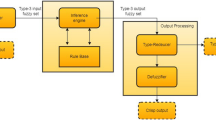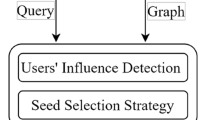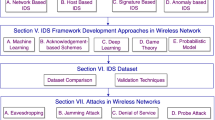Abstract
Mobile ad hoc Networks (MANETs) represent a group of mobile nodes that constitutes the network deprived of any pre-established infrastructure. In MANETs, the mobile nodes play an anchor role of a host and a router, thereby they possess the capability of sending and receiving the packet amid source and destination based on the cooperation rendered by the intermediary nodes of the routing path. However, existence of malicious as well as selfish nodes severally crumbles the performance of the network. The reputation-based cooperation approaches are essential for identifying malevolent and selfish nodes and segregate them from the network. At this juncture, multiple attribute decision making is confirmed to the ideal candidate for determining the reputation rank associated with the nodes during data dissemination. In this paper, An Integrated Z-number, and DEMATEL-based Cooperation Enforcement (IZ-DEMATELCE) scheme is contributed for finding the reputation of the mobile nodes for thwarting the impact of malevolent as well as selfish nodes in the network. This IZ-DEMATELCE-based reputation approach completely concentrates on identifying the weights and mutual influential relationships existing among the attributes that are used for confirming the malicious behaviour of mobile nodes. It adopts the merits of Z number-based reference ideal method for estimating the resilience potential of mobile nodes to incorporate appropriate decision-making strategies essential for isolating malicious nodes. It also uses the benefits of Trapezoidal Fuzzy Numbers to determine the information uncertainty and assesses the reliability/confidence of neighbouring nodes towards the nodes in the routing path that is monitored.























Similar content being viewed by others
Data Availability
Not applicable.
Code Availability
Not applicable.
References
Sengathir, J., & Manoharan, R. (2017). Co-operation enforcing reputation-based detection techniques and frameworks for handling selfish node behaviour in MANETs: A review. Wireless Personal Communications, 97(3), 3427–3447.
Arora, D., Gupta, S., & Anpalagan, A. (2022). Evolution and adoption of next generation IoT-driven health care 4.0 systems. Wireless Personal Communications, 127, 1–81. https://doi.org/10.1007/s11277-022-09932-3
Sudhakar, T., Natarajan, V., Gopinath, M., & Saranyadevi, J. (2020). An enhanced authentication protocol for multi-server environment using password and smart card. Wireless Personal Communications, 115(4), 2779–2803. https://doi.org/10.1007/s11277-020-07462-4
Pamarthi, S., & Narmadha, R. (2022). Adaptive key management-based cryptographic algorithm for privacy preservation in wireless mobile adhoc networks for IoT applications. Wireless Personal Communications, 124(1), 349–376. https://doi.org/10.1007/s11277-021-09360-9
Hammamouche, A., Omar, M., Djebari, N., & Tari, A. (2018). Lightweight reputation-based approach against simple and cooperative Black-hole attacks for MANET. Journal of Information Security and Applications, 43(4), 12–20.
Janakiraman, S., & Jayasingh, B. B. (2019). A hyper-exponential factor-based Semi-Markov prediction mechanism for selfish rendezvous nodes in MANETs. Wireless Personal Communications, 108(3), 1493–1511.
Ourouss, K., Naja, N., & Jamali, A. (2020). Defending against smart Grayhole attack within MANETs: A reputation-based ant colony optimization approach for secure route discovery in DSR protocol. Wireless Personal Communications, 116(1), 207–226.
Sudhakar, T., Ramalingam, P., & Jagatheswari, S. (2022). An improved proxy-vehicle based authentication scheme for vehicular ad-hoc networks. International Journal of Information Technology, 14, 2441–2449. https://doi.org/10.1007/s41870-022-00938-5
Ramasamy, V., Srirangan, J., & Ramalingam, P. (2021). Fuzzy and position particle swarm optimized routing in VANET. International Journal of Electrical and Computer Engineering Systems, 12(4), 199–206.
Chatterjee, P., Ghosh, U., Sengupta, I., & Ghosh, S. K. (2014). A trust enhanced secure clustering framework for wireless ad hoc networks. Wireless Networks, 20(7), 1669–1684.
Ghosh, U., & Datta, R. (2015). A secure addressing scheme for large-scale managed MANETs. IEEE Transactions on Network and Service Management, 12(3), 483–495.
Manoranjini, J., Chandrasekar, A., & Jothi, S. (2019). Improved QoS and avoidance of black hole attacks in MANET using trust detection framework. Automatika, 60(3), 274–284.
Gopala Krishnan, C., Gomathi, S., Aravind Swaminathan, G., Robinson, Y. H., & AnushaBamini, A. M. (2022). Trust management framework and high energy efficient lifetime management system for MANET using self-configurable cluster mechanism. Wireless Personal Communications. https://doi.org/10.1007/s11277-022-10048-x
Marathe, N. R., & Shinde, S. K. (2021). Multidimensional multi-attribute approach to counter the routing attacks on MANET. Wireless Personal Communications, 119(3), 1993–2016. https://doi.org/10.1007/s11277-021-08315-4
Janakiraman, S., Priya, M. D., & Jebamalar, A. C. (2021). Integrated context-based mitigation framework for enforcing security against rendezvous point attack in MANETs. Wireless Personal Communications, 119(3), 2147–2163.
Roles, A., & ElAarag, H. (2017). Coexistence with malicious and selfish nodes in wireless ad hoc networks: A Bayesian game approach. Journal of Algorithms & Computational Technology, 11(4), 353–365.
Durga Devi, S., & Rukmani Devi, D. (2019). Malicious node and malicious observer node detection system in MANETs. Concurrency and Computation: Practice and Experience, 33(3), e5241.
Gopala Krishnan, C., Nishan, A. H., Gomathi, S., & Aravind Swaminathan, G. (2021). Energy and trust management framework for MANET using clustering algorithm. Wireless Personal Communications, 122(2), 1267–1281.
Subburayalu, G., Duraivelu, H., Raveendran, A. P., Arunachalam, R., Kongara, D., & Thangavel, C. (2021). Cluster based malicious node detection system for mobile ad-hoc network using ANFIS classifier. Journal of Applied Security Research, 9(5), 1–19.
Farahani, G. (2021). Black hole attack detection using k-nearest neighbor algorithm and reputation calculation in mobile ad hoc networks. Security and Communication Networks, 2021(4), 1–15.
Rani, P., Verma, S., Kaur, N., Wozniak, M., Shafi, J., & Ijaz, M. F. (2021). Robust and secure data transmission using artificial intelligence techniques in ad-hoc networks. Sensors, 22(1), 251.
Bounouni, M., Bouallouche-Medjkoune, L., Beraza, A., & Daoud, A. (2021). Eliminating selective dropping attack in mobile ad hoc network. Wireless Personal Communications, 123(4), 3291–3308.
Sirisala, S., & Rama Krishna, S. (2021). Fuzzy complex proportional assessment of alternatives-based node cooperation enforcing trust estimation scheme for enhancing quality of service during reliable data dissemination in mobile ad hoc networks. International Journal of Communication Systems, 34(7), 67–79.
Jagatheswari, S., Ramalingam, P., & Chandra Priya, J. (2022). Improved grey relational analysis based TOPSIS method for cooperation enforcing scheme to guarantee quality of service in MANETs. International Journal of Information Technology, 14(2), 887–897.
Fayaz, M., Mehmood, G., Khan, A., Abbas, S., Fayaz, M., & Gwak, J. (2022). Counteracting selfish nodes using reputation-based system in mobile ad hoc networks. Electronics, 11(2), 185.
Yamini, K. A., Stephy, J., Suthendran, K., & Ravi, V. (2022). Improving routing disruption attack detection in MANETs using efficient trust establishment. Transactions on Emerging Telecommunications Technologies, 33(5), 1–13.
Mylsamy, R., & Jayaprakash, K. (2022). Fuzzy preference ranking organization method for enrichment evaluation-based node cooperation technique for improving QoS in MANETs. International Journal of Communication Systems, 35(10), 12–24.
Chatzidakis, M., & Hadjiefthymiades, S. (2022). A trust change detection mechanism in mobile ad-hoc networks. Computer Communications, 187(4), 155–163.
Chiejina, E., Xiao, H., Christianson, B., Mylonas, A., & Chiejina, C. (2022). A robust Dirichlet reputation and trust evaluation of nodes in mobile ad hoc networks. Sensors, 22(2), 571.
Gopala Krishnan, C., Nishan, A. H., & Prasanna Venkatesh, T. (2022). K-means clustering based energy and trust management routing algorithm for mobile ad-hoc networks. International Journal of Communication Systems, 35(9), 12–24.
Kavitha, N. S., & Malathi, P. (2017). Analysis of congestion control based on Engset loss formula-inspired queue model in wireless networks. Computers & Electrical Engineering, 64(5), 567–579.
Madhavi, S., Udhaya Sankar S. M., Praveen R., & Jagadish Kumar, N. A fuzzy COPRAS-based decision-making framework for mitigating the impact of vampire sensor nodes in wireless sensor nodes (WSNs) International Journal of Information Technology, https://doi.org/10.1007/s41870-023-01219-5
Madhavi, S.,Santhosh, N.C., Rajkumar, S., & Praveen, R. (2023) Pythagorean Fuzzy Sets-based VIKOR and TOPSIS-based multi-criteria decision-making model for mitigating resource deletion attacks in WSNs Journal of Intelligent & Fuzzy Systems, 1–19 https://doi.org/10.3233/JIFS-224141
Praveen, R., & Pabitha, P, (2023) A secure lightweight fuzzy embedder based user authentication scheme for internet of medical things applications Journal of Intelligent & Fuzzy Systems, 1–20 https://doi.org/10.3233/JIFS-223617
Ramalingam, Praveen Parameswaran, Pabitha Improved Gentry–Halevi's fully homomorphic encryption‐based lightweight privacy preserving scheme for securing medical Internet of Things Transactions on Emerging Telecommunications Technologies https://doi.org/10.1002/ett.4732
Pabitha ,P., Chandra, J., Priya R., & Praveen S., Jagatheswari ModChain: a hybridized secure and scaling blockchain framework for IoT environment International Journal of Information Technology, https://doi.org/10.1007/s41870-023-01218-6
Funding
Not applicable.
Author information
Authors and Affiliations
Corresponding author
Ethics declarations
Conflict of interest
The authors have not disclosed any competing interests.
Additional information
Publisher's Note
Springer Nature remains neutral with regard to jurisdictional claims in published maps and institutional affiliations.
Rights and permissions
Springer Nature or its licensor (e.g. a society or other partner) holds exclusive rights to this article under a publishing agreement with the author(s) or other rightsholder(s); author self-archiving of the accepted manuscript version of this article is solely governed by the terms of such publishing agreement and applicable law.
About this article
Cite this article
Udhaya Sankar, S.M., Jagadish Kumar, N., Elangovan, G. et al. An Integrated Z-Number and DEMATEL-Based Cooperation Enforcement Scheme for Thwarting Malicious Nodes in MANETs. Wireless Pers Commun 130, 2531–2563 (2023). https://doi.org/10.1007/s11277-023-10391-7
Accepted:
Published:
Issue Date:
DOI: https://doi.org/10.1007/s11277-023-10391-7




